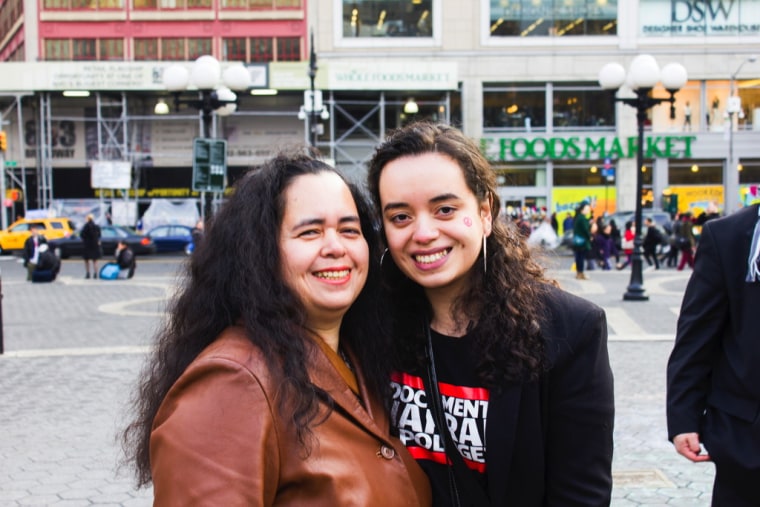Sept. 15 marked the start of National Hispanic Heritage Month — or, as it is known in Spanish, Mes de la Herencia Hispana — a time when the United States pays tribute to the history, culture and contributions of past and present Hispanic Americans.
According to the 2010 Census, 50.5 million Americans identify as Hispanic — and that number is growing. Immigration has long been a part of America’s national history, and the role that immigrants have played — and still play — in building this country is one of the reasons “the American dream” is still shared around the world today. America is a place where new beginnings and new lives are possible.
Over the next month, msnbc.com will be profiling outstanding Hispanic activists who are making a difference in the fight for immigration reform and who are providing critical support services to undocumented communities.
"If there were a real comprehensive and humane line to get on, there wouldn't be about 11 million undocumented immigrants."'
Name: Angy Paola Rivera
City, State: Queens, NY
Occupation/Organization: Core Member / New York State Youth Leadership Council
How did you get involved with immigration advocacy?
I was president of a club my senior year of high school. Through the club, I first heard of the work the New York State Youth Leadership Council (NYSYLC) was doing. I never met a group like them before. When I found out I wouldn't be eligible for state or federal financial aid to attend college because I was undocumented, I was pushed into action. I attended a get active training that the NYSYLC hosted, and after receiving their scholarship, I became a summer intern and stayed involved.
Give us a sense of what your day looks like:
Now that school is back in session, I go to class and have a fellowship with the National Latina Institute for Reproductive Health Monday through Fridays. I continue to be involved with the NYSYLC. Many times, we have an event or meetings after school. Sometimes I miss class to attend events or attend events during the weekend. I run Ask Angy, a national undocumented youth advice column. If I don't have access to my laptop, I work out of school or from my phone. A lot of emails, calls and drafting up responses to questions. Somewhere throughout the craziness I try to sleep, complete homework assignments, and have a social life. I give up time with friends or family for events and other projects. I hope it'll pay off in the end.
What is the biggest misconception about immigration reform/undocumented immigrants?
There are many misconceptions about the undocumented community, one being that they don't pay taxes. Another, that undocumented immigrants are only Mexican or align with one political party. Finally, a very famous misconception of undocumented immigrants is that fixing your immigration status is simple, you only need to get "on the line". If there were a real comprehensive and humane line to get on, there wouldn't be about 11 million undocumented immigrants. With regards to immigration reform, there is always this idea that any form of relief will incentivize more people to come, but it wouldn't, because they wouldn't be eligible. Any proposed reform won't benefit the whole undocumented community. The past proposed bills usually plan on increasing deportations and allocating more funding for them.
What is your expectation of President Obama and Congress in regard to the border crisis?
I am actually disappointed in Congress and the president. I don't expect them to do anything productive for the unaccompanied minors situation. Instead, their deportations have been expedited. It's heartbreaking and frustrating to see this happen. If there isn't any support for children, much less for older undocumented immigrants, I do hope that different state institutions, places of worship, schools etc. would support the children and their families.
What type of help is most needed on the ground and how can one get involved?
There is always something to contribute to within the immigrant rights movement. We are always in need of donations and more hands to do the work. We are in need of more scholarships that benefit the larger undocumented community, not just overachieving students, and also Deferred Action for Childhood Arrival (DACA) funds. We definitely need more undocumented immigrants to get involved and fight for their rights. There will be no undocumented immigrant rights movement without immigrants themselves. Here in New York, we at the NYSYLC, are dedicated to supporting the development of Dream Teams, clubs for undocumented immigrants and their supporters, in high schools and on college campuses. We are also here to support teachers and guidance counselors who want to receive more training about how to best work with undocumented students. If you're interested, check our website out http://www.nysylc.org and find out more ways to be involved.
Was there ever an instance when you felt defeated? What made you keep going?
There have been many times when I felt defeated. I felt powerless the day I found out I wasn't eligible for financial aid and an administrator in a college campus shamed me for being undocumented. I thought I wasn't going to be able to attend college. I also felt powerless because of the sexual abuse I felt as a child which is why I am speaking out about it in this documentary about my story No Digas a Nadie (don't tell anybody). While this crime made me eligible for a U non-immigrant Visa, there is still a long way to go for immigrant rights and speaking out against injustices is a first step. Fear is limiting and I hope we continue to fight back against inequality. We are broken and deal with so much pain and trauma from our lived experiences, having healing and supportive spaces are necessary.
Connect with Angy on Twitter @AskAngy, Facebook, and her column Ask Angy
For more Latino activist stories, head to speakout.msnbc.com.
(Response were edited for clarity)
